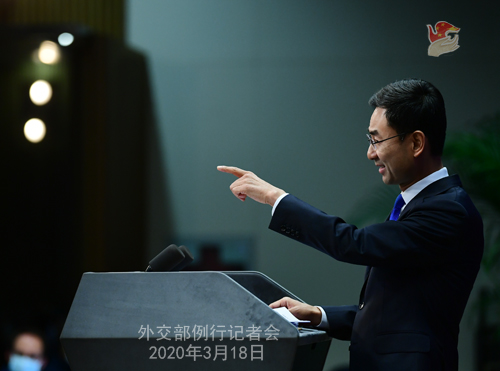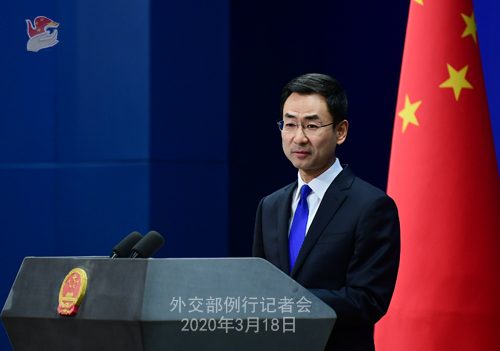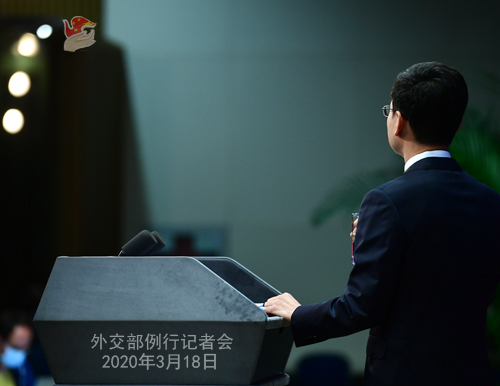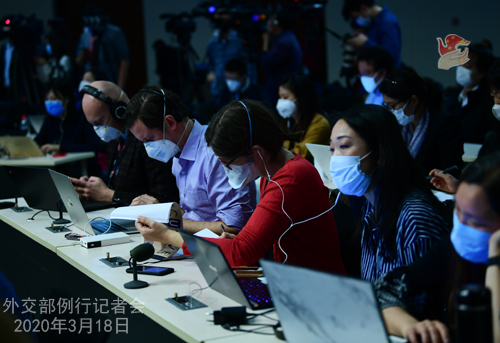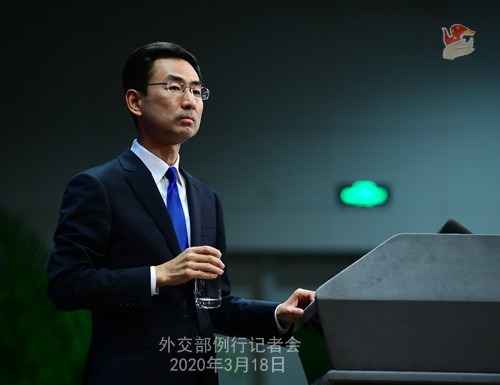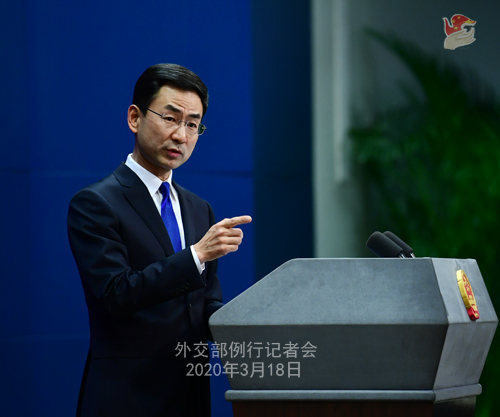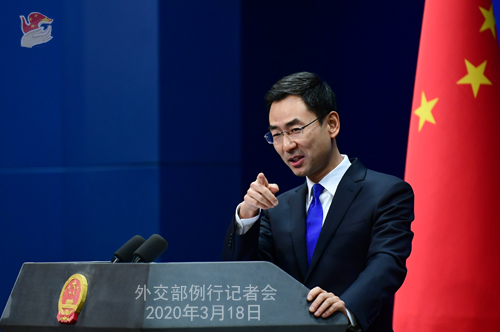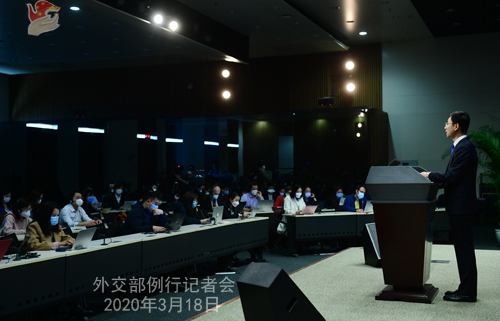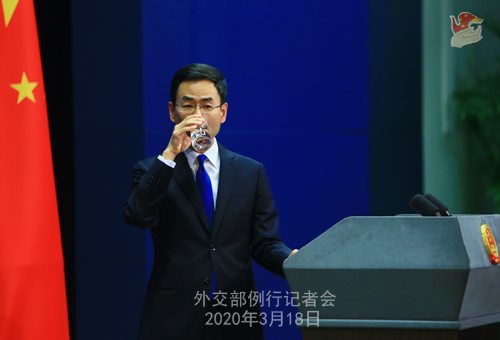| Foreign Ministry Spokesperson Geng Shuang's Regular Press Conference on March 18, 2020 |
| 2020-03-19 00:03 |
|
According to the latest figures from the NHC this morning, March 17 saw 922 patients cured and discharged from hospital in China's mainland, bringing the tally to 69,601. On the night of March 19 Beijing time, China will hold a video conference with government officials and health specialists from over 10 European countries to share information and experience on COVID-19. we will release more information in due course. Since the outbreak, European countries and regional organizations have lent strong support and assistance to China. Now as the situation is getting more severe in Europe, with the vision of a community with a shared future for mankind, China will share its experience and provide its utmost assistance for those European countries in need. Q: As the COVID-19 pandemic spreads all over the world, many countries have requested help from China. Can you share any information on China's medical assistance to other countries? Any specific numbers or categories, perhaps? A: The COVID-19 pandemic has rapidly spread to multiple countries. While making all-out efforts to combat it at home, China is actively engaging in international cooperation and providing as much help as possible to other countries and international organizations. This is how we fulfill our international responsibilities and consolidate earlier medical progress. As I know, the Chinese government has delivered medical supplies to Pakistan, Laos, Thailand, Iran, the ROK, Japan and the African Union, donated $20 million to the WHO, and announced assistance to be delivered to dozens of countries including Italy, France, Spain, Greece, Serbia, the EU, Cambodia, the Philippines, Egypt, South Africa, Iraq, Ethiopia, Kazakhstan, Belarus, Cuba and Chile. We also support countries' procurement of medical supplies made in China. Our local governments, enterprises and civil institutions also made donations to other countries. Besides, China is sharing our medical know-how with the world by sending healthcare professionals to Iran, Iraq, Italy and other countries, and holding video conferences with other countries and international organizations. "You throw a peach to me, and I give you a white jade for friendship." It is China's traditional virtue to repay goodwill with greater kindness. We will never forget the political support from the international community during our hardest times, as well as the medical supplies we received from 79 countries and 10 international organizations. We will strengthen cooperation with other countries in response to the COVID-19 challenge and together build a community with a shared future for mankind. Q: China announced restrictive measures on several US media agencies in China in response to US oppression against Chinese media outlets in the US. I wonder on what basis did China choose these media agencies? And how do you view the impact of such tit-for-tat restrictions on China-US relations? A: We are compelled to take these countermeasures because the unwarranted political oppression the US-based Chinese media have suffered necessitates them. We are not the reason and the responsible party for the current situation. If any US media agency has any problems with it, they should raise them to the US government. As for how China-US relations will be affected, I want to briefly tell you that more than 40 years have passed since the establishment of diplomatic ties between China and the US. Both sides have benefited immensely from the thriving interactions and cooperation in people-to-people exchange and cultural sectors. The truth is that the Chinese media has for so many years played a significant role in helping the Chinese people understand the US better and in nurturing a friendly feeling towards the US. We urge the US to drop its ideological bias, let go of the Cold War mentality and zero-sum game mindset, and do something to improve mutual trust and cooperation between the two sides. We do not wish to make trouble, but if trouble comes, we won't shy away. China urges the US to immediately stop its oppression on Chinese media. Otherwise, the US has more to lose.
Q: US Secretary of State Mike Pompeo said yesterday that the media agencies they identified as foreign missions a few weeks back were part of Chinese propaganda outlets. These aren't apples to apples, because the US media China's countermeasures target are those criticized by US government and president and they're not part of US government agencies. So I wonder in what sense are these countermeasures taken by China reciprocal? Since China accuses the US of unwarranted restrictions, then on what ground does China target these specific media agencies? A: I need to stress that China is committed to the path of socialism with Chinese characteristics. It is the same when it comes to the media sector. Chinese media stick to the Constitution and laws when carrying out their work. Chinese media working in the US also honor the US laws and abide by the ethics of journalism. The US should not judge other countries' media according to their own standards and preferences based on ideological prejudice, let alone oppress Chinese media for unfounded reasons. Some US media, despite their misdeeds, have been backed up and emboldened by the US government. If we follow the logic of those in the US, then can we assume that these US media are actually working for the US government? What are their connection with the US government and interest groups? Q: In the statement it issued today China demands that journalists working with the New York Times, the Wall Street Journal and the Washington Post hand back their press cards within ten calendar days. Does that mean they have to leave China's territory in ten days? A: We ask them to notify the Information Department of the Ministry of Foreign Affairs within four days and hand back their press cards within ten days. As for when they will leave the country, we are dealing with it following Regulations of the People's Republic of China on News Coverage by Permanent Offices of Foreign Media Organizations and Foreign Journalists (Decree 537 of the State Council) and relevant Chinese laws and regulations on border entry and exit. We also take into consideration the situation on the ground, including the COVID-19 epidemic. By contrast, the US asked 60 Chinese journalists to leave by March 13. We talked to the US many times for some flexibility and a grace period considering the epidemic and the fact that it was very hard to book airline tickets at that time. However, no leeway or flexibility was given. But China will be more reasonable and will handle their exit in a more humane way. Q: Why is it specially noted that relevant journalists will not be allowed to continue working as journalists in China's Hong Kong and Macao Special Administrative Regions? Is it against the "one country, two systems" principle? If they do their job in these regions, will the central government demand the government of the Hong Kong and Macao SAR to take measures against them? Will they be deported? A: In taking these countermeasures against the US, the Central Government is exercising its diplomatic authority in accordance with the "one country, two systems" principle and the Basic Law. This is a professional, authoritative answer. Q: When up to the ten-day period the journalists hand back their press cards, how long do they then have to leave the country? Can they hang around in China for the rest of the year, work in a cafe or something? A: I'm afraid they cannot. Like I just said to CNN, we are following Regulations of the People's Republic of China on News Coverage by Permanent Offices of Foreign Media Organizations and Foreign Journalists (Decree 537 of the State Council), and relevant Chinese laws and regulations on border entry and exit. We also take into consideration the situation on the ground, especially the unfolding epidemic.
Q: Utah State Legislature passed a concurrent resolution, celebrating friendly ties with China and expressing the legislature and governor's support to the Chinese people and their efforts to contain the COVID-19 outbreak. Do you have any comment? A: We commend this resolution passed by Utah Senate and House of Representatives in support of Chinese people's fight against COVID-19. You may have watched the online video of elementary school students in Utah singing to cheer on China and Wuhan, which is widely applauded. All this is a touching display of friendship cherished by the Utah people towards the Chinese people. Since the epidemic broke out, US states and cities including California, Indiana, Nebraska, Massachusetts, Maryland, Utah, Connecticut, Oklahoma, Georgia, Hawaii, New York, Boston, Los Angeles have expressed sympathies and support for Chinese provinces and cities. American businesses, institutions and people have also donated money and supplies to China. Now as the pandemic is spreading in the US, in the same vein, Chinese businesses and civil societies are also supporting American people's epidemic response. Pandemic respects no borders and calls for a concerted response. We will continue to work with the international community, including the United States, to strengthen communication and cooperation and jointly address the challenges with all-out efforts to safeguard global public health security. Q: Can you tell us how many American journalists will be affected by China's countermeasures? How many are there in China altogether and how many Chinese nationals have a journalist work permit in the US? A: Today I am not here to talk about such details as who and how many. I am here to talk about principle. I must stress that we are compelled to take these countermeasures in response to the unreasonable oppression the Chinese media organizations have experienced in the US. They are legitimate and justified self-defense in every sense. This is a matter of principle. Q: Does the timing of this have anything at all to do with President Trump's comments about the "Chinese Virus"? A: Please read our statement again. As I said, these measures are necessary countermeasures against the political oppression and unwarranted restrictions by the US side on the US-based Chinese media. Q: Last night, President Trump referred to the coronavirus as the "Chinese Virus". He said it was in direct response to China saying about US military personnel spreading the virus to Wuhan. Do you have anything to say to that? A: I stated China's position very clearly yesterday. We firmly oppose the US deliberately linking the coronavirus with China, which is an act of stigmatization. Like we said repeatedly, the origin of the coronavirus is a matter of science that requires professional, science-based assessment. The WHO and the international community oppose stigmatizing linkage between the virus and specific countries and regions. We urge the US to respect facts and the fair judgment of the international community, correct its mistake and stop its slanders against China at once. As the COVID-19 pandemic spreads all over the world, it is urgent for countries to cooperate. Shifting the blame to China will not help combat the epidemic in the US. The US should get its domestic issues handled first. In the meantime, we hope it will make constructive efforts in international cooperation to safeguard global public health security.
Q: COVID-19 has spread to more than 160 countries and regions. The number of confirmed cases worldwide has surpassed 180,000. All 27 members of the EU have succumbed to it. More than 20 African countries have seen confirmed cases. The situation is really very dire around the world. In your view, how should we cope with the challenge that this pandemic is now posing to the global public health security? A: COVID-19 is spreading at such a fast speed that the situation now is alarming. It is no longer the battle of one country or one city. It is now a battle for all with global public health security, mankind's health and well-being and world development and prosperity at stake. There is simply no second to be wasted any more. The urgency of the matter impels the international community to take up responsibility, jump into action, forge strong lines of defense, and fight together to protect global and regional public health security. First, we need to follow the concept of building a community of a shared future for mankind. Healthy lives for all is a common aspiration, which should also be an important part of the collective efforts to build a community with a shared future for mankind. A global public health crisis reveals more than anything that our future is intertwined and interdependent, and global cooperation against this pandemic has demonstrated vividly that the human society is making the right choice by building a community of a shared future for mankind to cope with this crisis. Faced with global threats such as a communicable disease, ensuring the health of people in one country is in itself a contribution to global public health security, and helping others is in a way helping yourself. All countries should choose solidarity, reason and action over disagreement, prejudice and procrastination, and work together to tide over the tough times. Second, we need to implement the health-related goals of the 2030 Agenda for Sustainable Development. In translating these commitments into practical actions and thus achieving these health targets, governments have the primary responsibility. They should work on strengthening the prevention and treatment of major communicable diseases, ensuring fair and accessible health care services, and realizing health coverage for all. Meanwhile, the international community should help prop up those countries with severe infections or fragile health systems, developing countries in particular, and plug the loopholes in the regional public health security networks, thus making the global networks stronger and more secure. Developed countries should lead such actions and make concrete contributions in this regard. Third, we need to strengthen global public health governance. The COVID-19 outbreak has laid bare inadequacies in the global public health governance and highlighted the urgency to buttress the system. We support the core role of the UN and WHO in responding to public health emergencies and in improving global public health governance mechanism and putting public health issues at a more prominent place on the international agenda. We call on the international community to work together to build a global prevention and control system to ensure public health security, improve epidemic monitoring, early warning, information sharing and emergency responding mechanisms, implement major international health projects, and make positive efforts to build a health Silk Road. We hope this pandemic can bring us greater solidarity, trust, international health cooperation and better global governance in the public health sector. China will continue to cooperate with the international community and contribute the Chinese wisdom and strength to better addressing global challenges and promoting the health and well-being of all mankind. Q: By asking the five American media agencies to declare in written form the information about their staff, finance, operation and real estate in China, do you mean that the Chinese government treats the five media agencies as foreign missions? A: I believe I made my point clear that our measures, including asking the five media agencies to declare information, are necessary countermeasures in response to the US listing five Chinese media agencies as "foreign missions" and unreasonable oppression on Chinese media agencies in the US. Follow-up: So you mean they are treated as foreign missions, right? A: Like I said, these are countermeasures in response to the US unreasonable oppression on Chinese media agencies in the US. According to our demand, they should declare the information to the Chinese side. I believe we made it clear in the statement.
Q: Czech Prime Minister Andrej Babis said on May 16 that his country had sent a military jet to carry back COVID-19 test kits they purchased from China. Can you confirm that? A: China follows closely the situation of COVID-19 in the Czech Republic and relates to the difficulties faced by the Czech government and people. At the critical moment when China was challenged by the epidemic, President Milos Zeman called on the Czech people to donate money and supplies, and the Czech government specially sent emergency medical supplies to China by military plane. When the Czech people are facing difficulties, China also provides our utmost assistance and support. With the full support of the Chinese foreign ministry and other departments, the Czech military aircraft loaded with testing kits left China for the Czech Republic last night. China is ready to further strengthen communication and cooperation with the Czech side, work together to combat the epidemic in the next stage and safeguard public health security of the two countries and the world at large. Q: With regard to China's countermeasures, does that affect the journalists working in Taiwan? A: The details are all there in our statement. You may read it more carefully. Q: If the US is going to take further actions, is China also prepared to take more countermeasures? A: Our position is very clear. We urge the US to immediately change course, correct its mistake, and stop its political oppression and arbitrary restrictions on Chinese media organizations. Should the US choose to go further down the wrong path, it could expect more countermeasures from China. The US side said all options are on the table. Well, today I'd like to tell them that all options are on our table, too. Q: Alibaba and other Chinese companies are sending assistance to the US. Under current circumstances, do you think it is still a good idea for Chinese companies to help the US in fighting the virus? A: You may have noticed that Mr. Jack Ma has posted information of assistance to the US on his social media account. Like we said repeatedly, virus knows no borders. After COVID-19 broke out, many American companies, civil groups and people made donations to China, for which we thank them. Now as the disease spreads, Chinese local governments and civil institutions are helping the US, too. Faced with the pandemic, it is important for China, the US and the international community to make collective response and safeguard global public health security as well as the interests and wellbeing of all. Q: The Chinese side recently suggested the virus was brought to China by the US military. Is there research or more evidence for that statement? A: This question has been asked too frequently. My brief answer: the origin of the coronavirus is a matter of science that requires professional, science-based assessment. We firmly oppose certain high-level US officials and congress members using it to smear China and the epidemic prevention efforts and progress made by the Chinese government and people.
Q: You said the journalists "expelled" will not be allowed to work in Hong Kong because it's a part of foreign policy. Would this also be the case for journalists currently working in Hong Kong or future journalists who want to work in Hong Kong? Would that also be decided by the foreign ministry in Beijing? A: These journalists' work is affected because of our necessary countermeasures, which China is compelled to take in response to the unreasonable oppression the Chinese media organizations have experienced in the US. The countermeasures are within the central government's diplomatic authority in accordance with the "one country, two systems" principle and the Basic Law. The explanation is applicable to the countermeasures we take this time. Follow-up: Does that affect foreign journalists working in Hong Kong now? A: As I said, it only affects journalists working in those media agencies involved in our countermeasures. Q: Article 35 of the Constitution of the PRC guarantees freedom of speech and freedom of the press. If journalists' press credentials are being revoked because of actions of their government, is their press freedom still guaranteed? A: Freedom of speech is fully guaranteed by our Constitution. As a journalist stationed in our country, I think you are well aware if journalists enjoy such freedom here. If foreign media and journalists do not have freedom of speech and the press in China, where do those large amounts of diversified, China-related articles in foreign media come from? Didn't you write them? Don't you enjoy the freedom? As I said, our measures are entirely necessary countermeasures that China is compelled to take in response to the unreasonable oppression the Chinese media organizations have experienced in the US. They are legitimate and justified self-defense in every sense. Q: A lot of countries aside from the US are looking at China at the moment for what lessons they could learn about outbreak prevention from the Chinese government. Are you concerned at all that this move to expel many American journalists who have been writing about China's epidemic response will undermine the transparency of the Chinese government about the epidemic? A: Since the outbreak, in an open, transparent and responsible spirit, China has taken the most comprehensive, rigorous and thorough measures of prevention and control to fight an all-out war against the epidemic. We are also in close communication and cooperation with WHO and relevant countries and regions to share information. The speed and scale of our action are unprecedented and have achieved notable results. We have bought precious time for the international community and made important contributions to the global fight against the epidemic. The international community knows this fully well and has made its fair judgment. It is simply absurd to say that China is attempting to hamper the outbound information flow about the epidemic. If that's true, did the US, by expelling 60 Chinese journalists last month, try to prevent China and other countries from learning about the spread of the virus on the ground? Can it be assumed that they were trying to hide something? The American people and the international community have a fair judgment on the US response as well as their level of openness and transparency. Q: I would like to ask about the 17+1 Summit, because you still communicate with CEE countries on this. Considering the spreading pandemic, will you call off the summit? A: As the COVID-19 spreads in Europe and other parts of the world, the urgent task for all countries is to focus on epidemic response. China will continue working with CEE countries and supporting each other in this area. We are keeping in contact with other countries on the timing of the China-CEEC Summit this year.
Q: When the world is combating COVID-19, China and the US are expelling journalists and blaming each other for the origin of the virus. For the rest of the world, we are looking at the two major powers on this planet, needing cooperation, instead it seems to be going the other way, descending, spiraling into this mud-slinging fest. Is there some way out of this? A: This question is deep. I can give you my answer, and I suggest your colleague in Washington ask the US side for theirs. Here's my answer. Both China and the US are important countries, and keeping a sound, stable China-US relationship serves the interests of both and the common aspiration of the international community. After the COVID-19 broke out, China has been in communication and cooperation with the US. We would like to work with the international community, including the US, to deal with the pandemic together and jointly safeguard international public health security. But what are we seeing here? We are seeing unwarranted accusations from certain US officials and congress members, triggering indignation among the Chinese people. We are seeing unreasonable restrictions and political oppression against Chinese media agencies in the US. China is compelled to make such countermeasures. It is the US who started it and is therefore responsible for the whole thing. Let me repeat this. We hope the US will act in a responsible manner, work with China to manage differences on the basis of mutual respect and expand cooperation with mutual benefit, and jointly move forward China-US relations featuring coordination, cooperation and stability. This is my answer for this question. You may also seek an answer from the US side. Q: There are about a hundred employees from Chinese state media in the US and we see here now that there are fewer and fewer American journalists in China. Three publications have to effectively shut down their operations because they don't have enough people left after two weeks. Is that indeed a proportionate response? Have you considered a more de-escalating response? A: I'd like to repeat my position that our measures are entirely necessary countermeasures that China is compelled to take in response to the unreasonable oppression the Chinese media organizations have experienced in the US. China is not responsible for and didn't cause this situation. We urge the US to immediately change course, correct its mistake, and stop its political oppression and arbitrary restrictions on Chinese media organizations. Q: Pakistani President Arif Alvi visited China on March 16 and 17. How does China comment on this visit and its impact on bilateral relations? A: This is President Alvi's first visit to China after taking office. It also comes at a special moment when the Chinese government and people are striving for the final victory in fighting against COVID-19, which once again demonstrates the special iron-clad friendship between China and Pakistan. China attaches great importance to this visit. President Xi Jinping, Premier Li Keqiang and Chairman of the NPC Standing Committee Li Zhanshu held talks and meetings with President Alvi respectively, on which readouts were released. The two sides also issued a joint statement to demonstrate the consensus reached by the two sides. I would like to stress the following points. First, this visit fully showcases China and Pakistan's relationship as iron-clad friends. President Alvi told the Chinese leadership that Pakistan considers its relationship with China a very special one. The more difficult the situation is, the more Pakistan should stand firmly with China. Pakistani leaders and people all support President Alvi's visit to China at this time. The main purpose is to demonstrate their support and confidence for Chinese friends, to show the international community the notable progress China has made in fighting the epidemic, and to showcase China's positive contribution to global public health security. Second, this visit demonstrates the fine tradition of mutual assistance between China and Pakistan. Right after the epidemic broke out, Pakistan mobilized the whole nation to provide assistance to China, which we will never forget. "Receiving drips of water when in need, and I shall return the kindness with a spring." Reciprocating an act of kindness is our nation's fine tradition. Now the situation in China is getting better and the number of confirmed cases in Pakistan has increased. The Chinese leadership has made it clear that we will do all we can to support our Pakistani friends. Following the consensus reached by the leaders of the two countries, we will continue to provide full assistance and support to the Pakistani people in response to the epidemic, the locust plague and other challenges. Third, this visit has deepened strategic mutual trust and consolidated practical cooperation between China and Pakistan. The two leaders exchanged in-depth views on the experience of epidemic prevention and control, coordination of epidemic response and socio-economic development, response to external economic and financial risks and deepening of major cooperation including on the China-Pakistan Economic Corridor. The two sides also signed an MOU on the establishment of working groups specialized in science and technology as well as agriculture under the CPEC Joint Cooperation Committee, and agreed to expand cooperation in related areas under the CPEC framework. A series of strategic consensuses reached during this visit will surely further deepen China-Pakistan all-round cooperation. Although the visit is short in duration, it is paid at a special time and of great significance, and has effectively enhanced China-Pakistan traditional friendship and mutually beneficial cooperation. In the course of jointly tackling COVID-19 and the plague of locusts, China and Pakistan have stood together and helped each other and there have been many touching stories. It is this friendship deeply cherished in people's hearts that provides the most solid foundation for China-Pakistan relations and sets an example for the building of a community with a shared future for mankind. It is believed that tested by the epidemics and other challenges, the iron-clad friendship between China and Pakistan will grow stronger and deeper, which will inject even stronger impetus into the all-weather strategic cooperative partnership between the two countries.
Q: Aren't you worried that by also expelling these journalists from Hong Kong, this will damage the world's trust in "one country, two systems"? A: Since Hong Kong's return to the motherland, the principles of "one country, two systems" and Hong Kong people governing Hong Kong with a high degree of autonomy have been faithfully implemented. The international community has a clear consensus on that and highly applauds that. Q: The New York Times, Wall Street Journal and Washington Post journalists being effectively banned from working in China are very accomplished in their field. Between them they have decades of experience reporting in China. During this critical time amid a global pandemic, I wonder if China is worried that the international community may have a worse sense of what's going on in China and China's policies after the expulsion of these journalists? A: If the US media have any complaints, I suggest they raise these complaints to their government. Our measures are entirely necessary countermeasures that China is compelled to take in response to the unreasonable oppression the Chinese media organizations have experienced in the US. As for if China's worried about the world's understanding of China after these journalists leave, I'd like to reiterate that China's basic state policy of opening-up hasn't changed and will remain unchanged. We welcome foreign media and journalists committed to reporting news in China according to law and regulation, and we will continue providing convenience and assistance. What we oppose is ideological bias towards China, fake news in the name of press freedom, and violation of professional ethics. We hope foreign media and journalists will play a positive role in enhancing the mutual understanding between China and the world, and we will continue supporting their news coverage in China. Q: When you mentioned fake news in the name of press freedom, are you saying these particular journalists being expelled are guilty of that? A: What I said is a principle. Any country and individual should reject fake news. This is something indisputable. Q: I feel my question has not been really answered. Has China considered deescalating the conflict when taking countermeasures? A: Like I said, the cause and responsibility for the situation doesn't lie with the Chinese side. We urge the US to immediately change its wrong course, correct its mistake and stop political oppression and unreasonable restrictions on Chinese media. Q: Can you tell us how many journalists will have to leave the country or submit their press cards? A: Like I said, today at this press conference we're not getting into specifics like who or how many. What we talk about here is principle. Q: You mentioned that all options were on China's table. Can you give us an example of what those might be? A: Perhaps we'd better get away from assumption or conjecture. We hope the US will immediately rectify its wrongdoing. Q: In the beginning you mentioned a video conference tomorrow night between China and some European countries. Can you tell us which countries will be participating? A: I have a list here, but let's save it for later, because there are going to be some updates. We will make that public after the press conference and you may know it then.
|
| |||||||||||||||
|
|||||||||||||||


